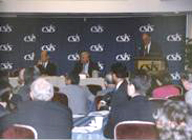October 15, 2003
| Date | October 15, 2003  |
|---|---|
| Venue | Center for Strategic and International Studies (CSIS) 1800 K Street, NW, Washington, D.C. 20006 TEL 202-457-8748 FAX202-835-3899 |
| Sponsors | Japan Economic Foundation (JEF) Center for Strategic and International Studies (CSIS) |
| Topics | Session 1: Impact of China's Rapid Economic Development Session 2: Political, Economic and Social Challenges facing China: Implications for China's Mid-term Development Session 3: Influence of Chinese and Other Asian Foreign Exchange Systems on Industrial Competitiveness and the Macro Economy Session 4: Summary and Conclusions |
Chairman's SpeechNoboru Hatakeyama Chairman and CEO Japan Economic Foundation
Chinese challenges the currency issues. And regarding the development of Chinese economy, I think everybody agreed that, for the time being, Chinese economy would continue to grow. There was a kind of consensus on this point.
However, there are many challenges China is going to face. There are so many challenges that I cannot remember every one of them, so I came up with an easy way to remember. This is an alphabetical order. A is appreciation of the Renminbi. B is bad loans. C is corruption, although it was not mentioned. D is deflation, which seems to be almost over, but as well as democratization necessity. And E is environmental issues, including the necessity of water, and the avoiding of desertification. Enterprises owned by state might also be a challenge. And F is fiscal deficit. G is gap between city and rural areas. And H is Household Registration Act, which was not necessarily mentioned, but this is important issue. As you know well, in China, there is a special law called the "Household Registration Act". This law prohibits, in principle, the movement of people from rural areas to urban areas, or vice versa, unless they have jobs and houses in their destination. Because of this law, factory managers in the coastal areas, such as Shenzhen do not allow workers from rural areas to work for more than three years in general. Therefore, those workers have to quit and return to their homes in rural areas.
The factory managers then hire new workers from rural areas at the same wages as they were paying to the former workers. This mechanism explains why wages have remained so low in the Chinese economy. However, because of the low productivity of agriculture due to the excessive farmer population, as the result of this law, and because of the Chinese people's desire for more freedom, this law has started to be relaxed in some cities, and in such cities, the wages have started going up. This is another challenge. China might lose one of the most attractive points - low wage rate in the near future. I is Islam power in the west of China. There is an Islam group working there. And J is justice system, which was mentioned by Mr. Nishimuro. And this is number 10, so I can go on like this, but I will stop here.
And regarding currency issues, there are interesting discussions. But I think everybody agreed with the idea, with the necessity of stopping or abandoning a fixed rate system, fixed rate exchange rate system. However, what matters turned out to be the timing. And if we abandon fixed exchange rate system, then we have to either float, or theoretically speaking, they have to adopt a floating system.
However, as Mr. Meyer pointed out, the Chinese people are saying now, of course we will go to floating system in the future, not now, not soon. And because they are just fighting against deflation, so they don't want to invite another deflationary element into their economy, which is floating system.
And in addition to this, they are very busy to be trying to comply with the WTO obligation, so it is not the time for them to change their currency system.
In addition to this, as Mr. Kuroda pointed out, leads and lags might be there if they keep fixed rate system, but if they go to a floating system, all of a sudden then shock wave might come by overshooting.
Then what should they do? The other alternative would be just to revalue, one-time appreciation. But if fixed system, pegging system is wrong, then how about another pegging system? Is it okay? If, theoretically speaking, pegging system is wrong because of Chinese necessity to depend upon the American monetary policy, depend upon FED policy, or Chinese unilateral decision, judgment, it's no good to keep fixed rate system. Then another pegging system, which is the result of revaluation, should also be no good theoretically. So where should we go?
However, although theoretically speaking, revaluation might not be good, in the practical world, this might be okay to head-off the protectionistic sentiment, especially in the congress. There was such an opinion. However, more practical opinion would be that a crawling pegging system might be better than just a simple revaluation, because simple revaluation would invite further revaluation. So there were different opinions as to the measures to change this system after the abandoning fixed rate system.
However, the direction of changing this system was agreed almost unanimously, and they agreed about -- almost agreed that now is the timing for China to change. And maybe some broader band system, including possible crawling peg system might be necessary to be considered.
Now last point I want to mention is the market opening, which was mentioned also. Someone wrote in FT the other day that China does not have to rush to go to floating system. Before then, China should open their markets more. But in the practical world, they are committed to WTO, and their schedule for liberalization is incorporated in their schedule for the WTO up until the year 2005. So they are busy to comply with this schedule already, so that's why they were not too enthusiastic in the Cancun negotiation. They happen to be one of the 22 or 21 developing countries group, and this was the group who ruined this Cancun meeting. And so China was not too enthusiastic to come up with the agreement coming out of the Cancun meeting, because they are too busy to be trying to comply with the obligation with WTO.
So before 2005, it is not too realistic for us to ask China to open their market further. After 2005, it will depend upon the development of argument in Cancun and the other meeting for our Doha development agenda. Thank you very much.
ParticipantsOctober 15, 2003List
SummarySummary
2017. JULY 2016. JUNE 2015. SEPTEMBER 2014. DECEMBER 2013. OCTOBER 2013. FEBRUARY 2011. NOVEMBER 2010. OCTOBER 2010. JANUARY 2008. DECEMBER 2007. NOVEMBER 2006. OCTOBER 2006. JULY 2005. SEPTEMBER 2004. MAY 2003. OCTOBER
